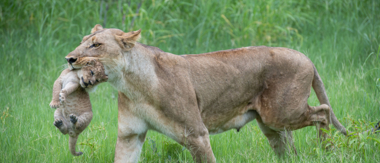What to pack
Africa is a continent of diverse beauty, but it can be difficult to acclimatise to its conditions. Ensure that you pack appropriately, so you can fully enjoy your safari experience.
Luggage requirements
Soft-sided travel bags are ideal for travel in Africa, as hard-shelled suitcases are not allowed on certain light aircraft. Try to pack light, as flights have luggage restrictions. A small backpack is always handy as onboard luggage and on game drives. All bags and suitcases should close properly to keep dust and insects out. (And be prepared for your luggage to get dirty!) Should you require further information about luggage restrictions, contact one of our Safari experts.
Sun protection
The African sun is harsh almost all year round. It is crucial to protect yourself, even if you are not in direct sunlight at all times. Sunscreen, hats and sunglasses are essential, especially if your skin has never been exposed to the African sun. Cool, lightweight clothing and comfortable shoes are recommended for the duration of your visit.
Hydration and snacks
You should always carry drinking water with you. In the African heat, dehydration can occur quickly – sometimes before even you realise it. Machaba safari rides provide water and other drinks and snacks, but it is advisable to carry you own bottle of water too. If you are travelling with children, insist that they drink water on a regular basis. Also, keep a snack with you in case of long drives.
Camera equipment
Bring the best camera and the best tele lens you can afford (200mm being the suggested minimum). Bring plenty of extra memory cards and extra batteries, and charge the batteries every time you get an opportunity. A tripod might be useful for waterholes and other static viewing areas. There is no standard electrical adaptor for the whole of Africa, so find out which one you need depending which country you are visiting. And as with everything of value, keep your camera equipment close to you and safe at all times.
Binoculars and torches/headlamps
We don’t recommend that you go on safari without binoculars, as you will miss out on remarkable opportunities to view African wildlife. If you are travelling with children, ensure that they have their own binoculars too. Flashlights are always useful when you travel, and headlamps are handy when camping if you need to move around a campsite at night.
Safari attire
It is always advisable to dress in layers due to fluctuating African temperatures. Cotton is a comfortable, breathable fabric, and long sleeves and trousers will protect you from sun and insects. A hat is essential, as are socks and closed shoes for walking. A warm jacket or fleece is necessary for early mornings and evenings, and a rain jacket or windbreaker will be useful if you are travelling during the rainy season.
First aid
A first aid kit, basic medication and travel insurance are essential for any trip to Africa. African roads can be bumpy, so if you are prone to car sickness you might want to bring appropriate medication with you. You might also want to bring medication to treat diarrhoea, and be sure to enquire as to whether you need to take malaria pills (depending on which area you are visiting). Refer to our Health and Safety page for further health-related information.
Turn your dreams into plans
Orange-gold sunsets, elephants swimming in the desert, the thrill of a leopard on a hunt. A safari to Africa is more than a holiday; it will change the way you think of the world for life.

Machaba Safaris Blog
Read our blog for updates from the bush and the latest sightings from our camps.
View Blog

